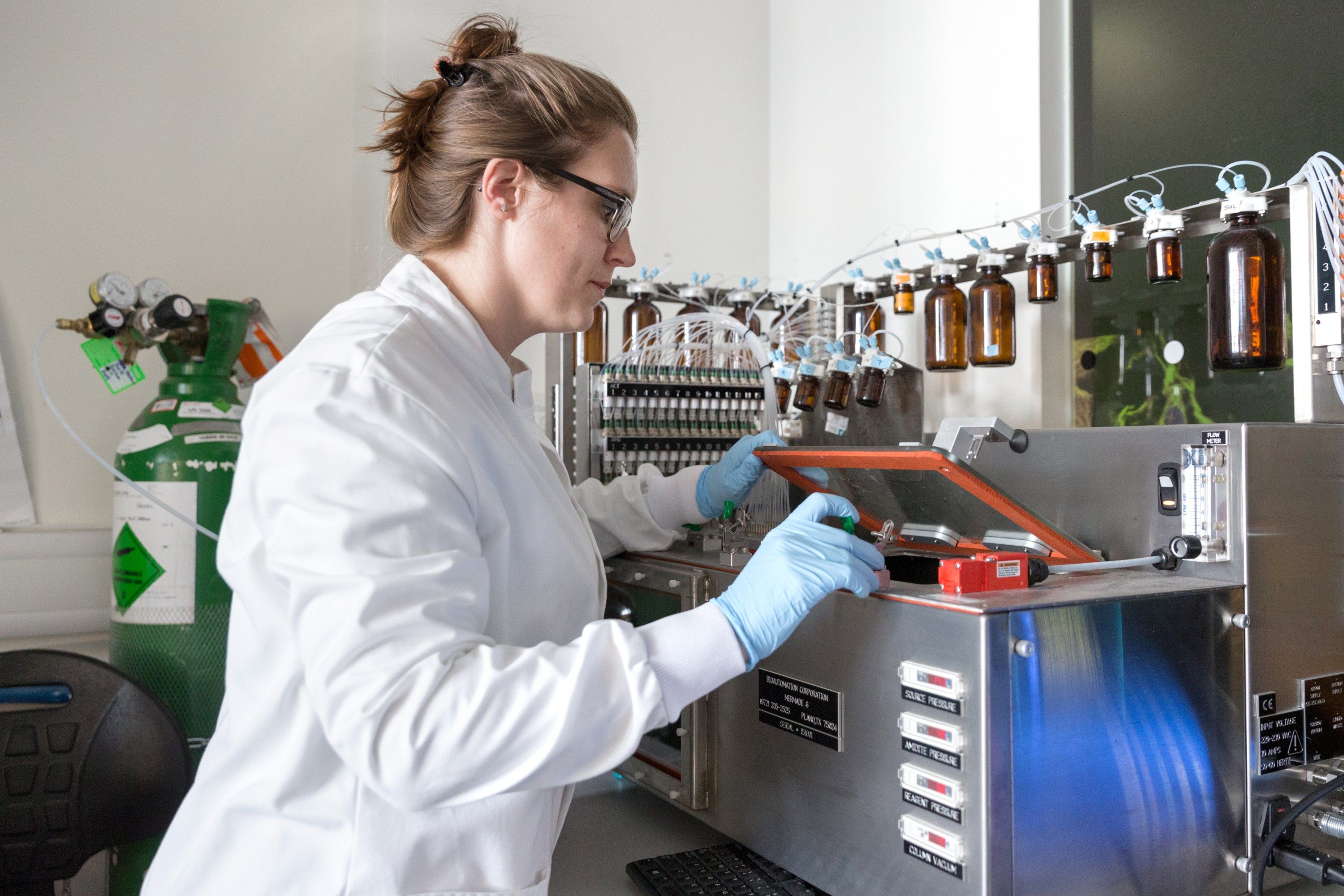
Molecular Bioengineering
Explore engineering, biology and chemistry to understand how vital molecular level interactions can benefit human health
Molecular Bioengineering with a Year Abroad
Explore engineering, biology and chemistry to understand how vital molecular level interactions can benefit human health
Molecular Bioengineering with a Year in Industry
Explore engineering, biology and chemistry to understand how vital molecular level interactions can benefit human health
Understand how vital molecular level interactions can benefit human health
Develop the scientific expertise of a life scientist and the problem-solving skills of an engineer
Enrich your studies with the opportunity to take a year abroad or put your knowledge into practice through a year in industry
Course key facts
-
Qualification
-
MEng
-
-
Duration
4 years
-
Start date
October 2025
-
UCAS course code
H160
-
Study mode
Full-time
-
Fees
£9,535 per year Home
£43,300 per year Overseas
-
Delivered by
-
Location
-
South Kensington
-
-
Applications: places
4 : 1 (2023)
Minimum entry standard
-
A*AA (A-level)
-
39 points (International Baccalaureate)
-
Qualification
-
MEng
-
-
Duration
4 years
-
Start date
October 2025
-
UCAS course code
Apply to H160
-
Study mode
Full-time
-
Fees
£9,535 per year Home
£43,300 per year Overseas
-
Delivered by
-
Location
-
South Kensington
-
-
Applications: places
4 : 1 (2023)
Minimum entry standard
-
A*AA (A-level)
-
39 points (International Baccalaureate)
-
Qualification
-
MEng
-
-
Duration
5 years
-
Start date
October 2025
-
UCAS course code
Apply to H160
-
Study mode
Full-time
-
Fees
£9,535 per year Home
£43,300 per year Overseas
-
Delivered by
-
Location
-
South Kensington
-
-
Applications: places
4 : 1 (2023)
Minimum entry standard
-
A*AA (A-level)
-
39 points (International Baccalaureate)
Course overview
As a molecular bioengineer, you'll learn how to engineer biological systems to solve challenges in health and wellbeing.
Through this course, you will develop the scientific understanding and laboratory expertise of a life scientist with the technical knowledge and problem-solving skills of an engineer.
With this unique combination of skills, you will be well placed to address the global challenges of today: health and well-being agenda, personalised medicine, new biomedical technology industries.
You will gain a theoretical understanding through lectures, study groups and taught classes. During practical wet and dry labs and activities, you will work on real-world projects in medicine and biology with life-changing potential.
You will learn professional standards and understand engineers’ obligations to society, the profession and the environment.
You will develop leadership, communication and teamwork skills, and graduate with the ability to become a leader in your chosen field.
As a molecular bioengineer, you'll learn how to engineer biological systems to solve challenges in health and wellbeing.
Through this course, you will develop the scientific understanding and laboratory expertise of a life scientist with the technical knowledge and problem-solving skills of an engineer.
With this unique combination of skills, you will be well placed to address the global challenges of today: health and well-being agenda, personalised medicine, new biomedical technology industries.
You will gain a theoretical understanding through lectures, study groups and taught classes. During practical wet and dry labs and activities, you will work on real-world projects in medicine and biology with life-changing potential.
You will learn professional standards and understand engineers’ obligations to society, the profession and the environment.
In your final year, you'll complete an integrated year abroad at one of our partner universities, where you can challenge yourself in a different academic and cultural environment.
You will develop leadership, communication and teamwork skills, and graduate with the ability to become a leader in your chosen field.
As a molecular bioengineer, you'll learn how to engineer biological systems to solve challenges in health and wellbeing.
Through this course, you will develop the scientific understanding and laboratory expertise of a life scientist with the technical knowledge and problem-solving skills of an engineer.
With this unique combination of skills, you will be well placed to address the global challenges of today: health and well-being agenda, personalised medicine, new biomedical technology industries.
You will gain a theoretical understanding through lectures, study groups and taught classes. During practical wet and dry labs and activities, you will work on real-world projects in medicine and biology with life-changing potential.
You will learn professional standards and understand engineers’ obligations to society, the profession and the environment.
In your fourth year, you'll complete a 12-month industry placement, where you'll gain invaluable experience applying your theoretical knowledge in a practical setting.
An extended individual project forms the key component of your final year, enabling you to gain an understanding of the latest developments in the bioengineering field.
You will develop leadership, communication and teamwork skills, and graduate with the ability to become a leader in your chosen field.
Structure
This page is updated regularly to reflect the latest version of the curriculum. However, this information is subject to change.
Find out more about potential course changes.
Please note: it may not always be possible to take specific combinations of modules due to timetabling conflicts. For confirmation, please check with the relevant department.
You’ll study all of the following core modules.
Core modules
Develop a foundational understanding of the chemistry and materials science principles related to bioengineering. Cultivate wet lab skills in preparing a range of biomaterials and practising key classification techniques.
Understand the underlying molecular basis of cellular and sub-cellular processes in cells and key concepts engineers use to interpret literature and models of cells.
Acquire a platform of mathematical knowledge and understand the basic principles of physics, electrical and mechanical engineering.
Learn the fundamentals of digital logic design and computer programming as you examine how digital computers communicate with the real world.
Discover the principles of engineering design and broaden your practical skills as you utilise appropriate tools and software to solve a variety of design problems.
You’ll study all of the following core modules.
Core modules
Extend your knowledge of materials and thermodynamics by examining how thermodynamics and quantum physics underpin the physical behaviour of materials-based systems.
Build upon your earlier studies as you explore new cellular and physiological concepts and uncover the regulators and modulators of gene expression. Broaden your wet lab skills and experience and learn a range of lab techniques.
Advance your knowledge of electronics and mechanics through an introduction to electromagnetics and solid and fluid mechanics. Understand the principles of signals and control and practise solving mathematical, signals and control, electrical and mechanical problems posed in a bioengineering context.
Harness the principles of engineering design and professional practice while collaborating on a Design, Make and Test group project. Work in a team to tackle a real design problem, broadening your engineering design skills and applying learning from other modules to a practical challenge.
Advance your programming knowledge by extending the principles introduced in ANSCI C language across to the study of C++. Engage in labs focusing on more complex programming skills, including data structures, object-oriented programming and algorithm design.
In your third year, you will study six core modules, including the i-Explore module.
You will also select three optional modules.
*Modules marked with an asterisk are level 7 modules. You will need to complete a minimum number of level 7 modules by the end of your degree.
Core modules
Examine probability theory and the mathematical concepts that underlie statistical models. Learn how to apply statistical models to real-world data and equip yourself with the statistical skills and knowledge required for the advanced years of your Bioengineering programme.
Cultivate skills in project management, planning, collaboration, communication and evaluation as you work in teams on a chosen research project. Your project may take various forms and could focus on design, computational work, bench work, extended literature reviews, or creating props for outreach programmes.
Examine the major classes of biomedical implant materials (including metals, ceramics and polymers), focusing on their clinical use as replacements for body parts or tissue and the various reasons for failure.
Study the principles of genetic engineering, synthetic biology and the design of biological machines. Extend your understanding of computational modelling of biological systems through practical application, and work on a mini i-Gem project using synthetic biology principles, computer modelling, ethics and experimental design.
Uncover the mathematical and computational modelling techniques used in biology and physiology. Explore nonlinear dynamics, networks in biology and the basics of stochastic processes in biology and medicine, and apply theory to practice as you develop your own models using MATLAB.
Choose from a range of subjects hosted outside of the department and learn alongside students from other areas of study.
Optional modules
Examine digital image processing and image analysis methods, and develop an appreciation of the computation involved in interpreting or ‘parsing’ images. Learn about the biomedical, clinical and research applications of image processing and computer vision.
Uncover the fundamental principles and techniques for representing, transforming and processing discrete-time signals. Deepen your knowledge through the practical implementation of theoretical concepts in biomedical applications.
Leverage your existing programming skills and gain experience working in a development team on a significant bioengineering software project. Learn software engineering tools, including those required for project lifecycle management, requirements capture, design, modelling, testing and effective teamwork.
Learn how to design intuitive and efficient rehabilitation systems and assistive devices, integrating mechatronics, human factors and computer games. Understand how to assess current and emergent systems against the principles of human-centred design.
Understand the fundamental concepts of tissue development and learn how researchers are using these concepts to imitate nature in a lab setting, engineering cells and tissues that may be used to model diseases, treat diseases or develop drugs.
Learn how to critically evaluate and carefully design imaging experiments in order to analyse dynamic processes in complex biological systems.
Study the key theoretical concepts underpinning science communication and education in schools and other learning environments. Observe real-world science communication through placement in a school or other learning environment, then design and deliver your own practical activities within this learning environment.
Uncover the broad industrial and societal applications of cellular engineering and synthetic biology research. Learn how engineering cell behaviours has applications in fields such as industrial biotechnology, sustainable agriculture, biomedicine and pharmaceutical production.
Discover the new interdisciplinary field of biomimetics, which explores how functional principles found in nature can inspire scientists and engineers to solve outstanding technological problems.
Develop your skills further by exploring the core aspects of biological and clinical measurement and research topics such as: data handling and fitness for purpose, chemical measurement in cells, bioassays and other detection methods, and challenges of non-invasive chemical monitoring of human tissue.
Develop your clinical understanding and learn to analyse cell function, with a particular emphasis on sub-cellular structures and functions involved in processes by which cells transform mechanical stimuli into biochemical signalling.
Build upon your clinical understanding of the development, progression and challenges facing cancer management. Investigate how engineering principles and next generation technologies can be developed and best applied to the understanding and management of cancer.
In your fourth year, you will spend six months exclusively working on a substantial individual project.
You will also select four optional modules from Group A, and one optional module from Group B.
*Modules marked with an asterisk are level 7 modules. You will need to complete a minimum number of level 7 modules by the end of your degree.
Core modules
Draw upon the knowledge and skills you’ve developed throughout your degree to tackle an unfamiliar research problem. Gain an understanding of the research environment as you work independently on a year-long research project that will address unanswered questions and challenges within an area of bioengineering.
Optional modules - Group A
Dive deeper into BioBrick concepts and explore advanced topics in synthetic biology. You will review the latest scientific literature and apply your knowledge as you devise solutions to real-world problems.
Examine the different methods for sensing and monitoring (bio)analytes and (bio)metabolites, both in vitro and in vivo. Learn the basic chemical sensing principles involved in these technologies, along with their biomedical applications and commercial considerations.
Analyse and discuss the scientific literature relating to core aspects of biological and clinical measurement. Broaden your understanding of data handling and fitness for purpose, chemical measurement in cells and in vivo, challenges of non-invasive chemical monitoring of human tissue and approaches to invasive monitoring of tissue.
Understand how images of the human body can be obtained using different forms of penetrating radiation. Explore the underlying systems, technologies and operating principles behind the imaging modalities of x-ray, computer tomography (CT), magnetic resonance (MRI), ultrasound, and general optical imaging work.
Explore ultrasound, MRI and light-based imaging and find out what information on the anatomy, composition and physiology of the human body these non-ionising imaging modalities can provide. Learn how to analyse images obtained through these methods and their range of clinical applications.
Gain insight into the process and challenges involved in the development of new products in the medical sector. Analyse case studies and hear guest presentations from startups, investment firms and entrepreneurs and learn from their experiences in bringing medical devices to market.
Receive practical training in bio-inspired robotics locomotion and learn about selected topics in animal locomotion. Consolidate your theoretical knowledge by participating in hands-on activities and reinforce your engineering skills through the implementation of mechatronics systems.
Discover the new interdisciplinary field of biomimetics, which explores how functional principles found in nature can inspire scientists and engineers to solve outstanding technological problems.
Examine the frontiers of biomaterials research and innovation by exploring the development of new biomaterials and highlighting their functionalities in various fields of application. Dive into their synthesis through the use of state-of-art technology such as synthetic biology and chemistry and biomimetic engineering.
Discover how engineering cell behaviours impact industrial biotechnology and the bioproduction of chemicals, sustainable agriculture, the environment and biofuels. Learn how academic research can lead to applied science with direct impact in industry and society.
Assess the latest in nanotechnological advances in the field of cancer diagnostics and cancer therapies. You'll explore how academic research can directly impact, through applied science, the way cancer patients are screened, diagnosed, monitored and treated. Developing your skills in molecular bioengineering and its applications in: development of screening tools, diagnosis at the point of care and nanotechnologies for targeted drug delivery.
Discover the core neuroscience concepts and explore the 'state of the art' in regards to methodology and learn to provide multi-level descriptions of common brain disorders.
Optional modules - Group B
Assess and discover the key information and skills needed by professional engineering in development of medical systems and devices. You'll explore product development for medical devices as well as safety, hazards and safe working practice.
Extend your practical knowledge across a range of business and management topics and gain an understanding of the financial, strategic, operational and organisational context in which engineering and science takes place.
Assess and discover the key information and skills needed by professional engineering in development of medical systems and devices. You'll explore product development for medical devices as well as safety, hazards and safe working practice.
You’ll study all of the following core modules.
Core modules
Develop a foundational understanding of the chemistry and materials science principles related to bioengineering. Cultivate wet lab skills in preparing a range of biomaterials and practising key classification techniques.
Understand the underlying molecular basis of cellular and sub-cellular processes in cells and key concepts engineers use to interpret literature and models of cells.
Acquire a platform of mathematical knowledge and understand the basic principles of physics, electrical and mechanical engineering.
Learn the fundamentals of digital logic design and computer programming as you examine how digital computers communicate with the real world.
Discover the principles of engineering design and broaden your practical skills as you utilise appropriate tools and software to solve a variety of design problems.
You’ll study all of the following core modules.
Core modules
Extend your knowledge of materials and thermodynamics by examining how thermodynamics and quantum physics underpin the physical behaviour of materials-based systems.
Build upon your earlier studies as you explore new cellular and physiological concepts and uncover the regulators and modulators of gene expression. Broaden your wet lab skills and experience and learn a range of lab techniques.
Advance your knowledge of electronics and mechanics through an introduction to electromagnetics and solid and fluid mechanics. Understand the principles of signals and control and practise solving mathematical, signals and control, electrical and mechanical problems posed in a bioengineering context.
Harness the principles of engineering design and professional practice while collaborating on a Design, Make and Test group project. Work in a team to tackle a real design problem, broadening your engineering design skills and applying learning from other modules to a practical challenge.
Advance your programming knowledge by extending the principles introduced in ANSCI C language across to the study of C++. Engage in labs focusing on more complex programming skills, including data structures, object-oriented programming and algorithm design.
In your third year, you will study six core modules, including the i-Explore module.
You will also select three optional modules.
*Modules marked with an asterisk are level 7 modules. You will need to complete a minimum number of level 7 modules by the end of your degree.
Core modules
Examine probability theory and the mathematical concepts that underlie statistical models. Learn how to apply statistical models to real-world data and equip yourself with the statistical skills and knowledge required for the advanced years of your Bioengineering programme.
Cultivate skills in project management, planning, collaboration, communication and evaluation as you work in teams on a chosen research project. Your project may take various forms and could focus on design, computational work, bench work, extended literature reviews, or creating props for outreach programmes.
Examine the major classes of biomedical implant materials (including metals, ceramics and polymers), focusing on their clinical use as replacements for body parts or tissue and the various reasons for failure.
Study the principles of genetic engineering, synthetic biology and the design of biological machines. Extend your understanding of computational modelling of biological systems through practical application, and work on a mini i-Gem project using synthetic biology principles, computer modelling, ethics and experimental design.
Uncover the mathematical and computational modelling techniques used in biology and physiology. Explore nonlinear dynamics, networks in biology and the basics of stochastic processes in biology and medicine, and apply theory to practice as you develop your own models using MATLAB.
Choose from a range of subjects hosted outside of the department and learn alongside students from other areas of study.
Optional modules
Examine digital image processing and image analysis methods, and develop an appreciation of the computation involved in interpreting or ‘parsing’ images. Learn about the biomedical, clinical and research applications of image processing and computer vision.
Uncover the fundamental principles and techniques for representing, transforming and processing discrete-time signals. Deepen your knowledge through the practical implementation of theoretical concepts in biomedical applications.
Leverage your existing programming skills and gain experience working in a development team on a significant bioengineering software project. Learn software engineering tools, including those required for project lifecycle management, requirements capture, design, modelling, testing and effective teamwork.
Learn how to design intuitive and efficient rehabilitation systems and assistive devices, integrating mechatronics, human factors and computer games. Understand how to assess current and emergent systems against the principles of human-centred design.
Understand the fundamental concepts of tissue development and learn how researchers are using these concepts to imitate nature in a lab setting, engineering cells and tissues that may be used to model diseases, treat diseases or develop drugs.
Learn how to critically evaluate and carefully design imaging experiments in order to analyse dynamic processes in complex biological systems.
Study the key theoretical concepts underpinning science communication and education in schools and other learning environments. Observe real-world science communication through placement in a school or other learning environment, then design and deliver your own practical activities within this learning environment.
Uncover the broad industrial and societal applications of cellular engineering and synthetic biology research. Learn how engineering cell behaviours has applications in fields such as industrial biotechnology, sustainable agriculture, biomedicine and pharmaceutical production.
Discover the new interdisciplinary field of biomimetics, which explores how functional principles found in nature can inspire scientists and engineers to solve outstanding technological problems.
Develop your skills further by exploring the core aspects of biological and clinical measurement and research topics such as: data handling and fitness for purpose, chemical measurement in cells, bioassays and other detection methods, and challenges of non-invasive chemical monitoring of human tissue.
Develop your clinical understanding and learn to analyse cell function, with a particular emphasis on sub-cellular structures and functions involved in processes by which cells transform mechanical stimuli into biochemical signalling.
Build upon your clinical understanding of the development, progression and challenges facing cancer management. Investigate how engineering principles and next generation technologies can be developed and best applied to the understanding and management of cancer.
The final year consists of an agreed programme of study at an approved university in either Australia, France, Singapore, Switzerland or the USA
We currently have exchange agreements with:
- University of Melbourne, Australia
- University of Grenoble, France
- National University of Singapore, Singapore
- ETH Zurich, Switzerland
- University of California, USA
This is an integrated year abroad so the grades you achieve will count directly towards your Imperial degree.
You’ll study all of the following core modules.
Core modules
Develop a foundational understanding of the chemistry and materials science principles related to bioengineering. Cultivate wet lab skills in preparing a range of biomaterials and practising key classification techniques.
Understand the underlying molecular basis of cellular and sub-cellular processes in cells and key concepts engineers use to interpret literature and models of cells.
Acquire a platform of mathematical knowledge and understand the basic principles of physics, electrical and mechanical engineering.
Learn the fundamentals of digital logic design and computer programming as you examine how digital computers communicate with the real world.
Discover the principles of engineering design and broaden your practical skills as you utilise appropriate tools and software to solve a variety of design problems.
You’ll study all of the following core modules.
Core modules
Extend your knowledge of materials and thermodynamics by examining how thermodynamics and quantum physics underpin the physical behaviour of materials-based systems.
Build upon your earlier studies as you explore new cellular and physiological concepts and uncover the regulators and modulators of gene expression. Broaden your wet lab skills and experience and learn a range of lab techniques.
Advance your knowledge of electronics and mechanics through an introduction to electromagnetics and solid and fluid mechanics. Understand the principles of signals and control and practise solving mathematical, signals and control, electrical and mechanical problems posed in a bioengineering context.
Harness the principles of engineering design and professional practice while collaborating on a Design, Make and Test group project. Work in a team to tackle a real design problem, broadening your engineering design skills and applying learning from other modules to a practical challenge.
Advance your programming knowledge by extending the principles introduced in ANSCI C language across to the study of C++. Engage in labs focusing on more complex programming skills, including data structures, object-oriented programming and algorithm design.
In your third year, you will study six core modules, including the i-Explore module.
You will also select three optional modules.
*Modules marked with an asterisk are level 7 modules. You will need to complete a minimum number of level 7 modules by the end of your degree.
Core modules
Examine probability theory and the mathematical concepts that underlie statistical models. Learn how to apply statistical models to real-world data and equip yourself with the statistical skills and knowledge required for the advanced years of your Bioengineering programme.
Cultivate skills in project management, planning, collaboration, communication and evaluation as you work in teams on a chosen research project. Your project may take various forms and could focus on design, computational work, bench work, extended literature reviews, or creating props for outreach programmes.
Examine the major classes of biomedical implant materials (including metals, ceramics and polymers), focusing on their clinical use as replacements for body parts or tissue and the various reasons for failure.
Study the principles of genetic engineering, synthetic biology and the design of biological machines. Extend your understanding of computational modelling of biological systems through practical application, and work on a mini i-Gem project using synthetic biology principles, computer modelling, ethics and experimental design.
Uncover the mathematical and computational modelling techniques used in biology and physiology. Explore nonlinear dynamics, networks in biology and the basics of stochastic processes in biology and medicine, and apply theory to practice as you develop your own models using MATLAB.
Choose from a range of subjects hosted outside of the department and learn alongside students from other areas of study.
Optional modules
Examine digital image processing and image analysis methods, and develop an appreciation of the computation involved in interpreting or ‘parsing’ images. Learn about the biomedical, clinical and research applications of image processing and computer vision.
Uncover the fundamental principles and techniques for representing, transforming and processing discrete-time signals. Deepen your knowledge through the practical implementation of theoretical concepts in biomedical applications.
Leverage your existing programming skills and gain experience working in a development team on a significant bioengineering software project. Learn software engineering tools, including those required for project lifecycle management, requirements capture, design, modelling, testing and effective teamwork.
Learn how to design intuitive and efficient rehabilitation systems and assistive devices, integrating mechatronics, human factors and computer games. Understand how to assess current and emergent systems against the principles of human-centred design.
Understand the fundamental concepts of tissue development and learn how researchers are using these concepts to imitate nature in a lab setting, engineering cells and tissues that may be used to model diseases, treat diseases or develop drugs.
Learn how to critically evaluate and carefully design imaging experiments in order to analyse dynamic processes in complex biological systems.
Study the key theoretical concepts underpinning science communication and education in schools and other learning environments. Observe real-world science communication through placement in a school or other learning environment, then design and deliver your own practical activities within this learning environment.
Uncover the broad industrial and societal applications of cellular engineering and synthetic biology research. Learn how engineering cell behaviours has applications in fields such as industrial biotechnology, sustainable agriculture, biomedicine and pharmaceutical production.
Discover the new interdisciplinary field of biomimetics, which explores how functional principles found in nature can inspire scientists and engineers to solve outstanding technological problems.
Develop your skills further by exploring the core aspects of biological and clinical measurement and research topics such as: data handling and fitness for purpose, chemical measurement in cells, bioassays and other detection methods, and challenges of non-invasive chemical monitoring of human tissue.
Develop your clinical understanding and learn to analyse cell function, with a particular emphasis on sub-cellular structures and functions involved in processes by which cells transform mechanical stimuli into biochemical signalling.
Build upon your clinical understanding of the development, progression and challenges facing cancer management. Investigate how engineering principles and next generation technologies can be developed and best applied to the understanding and management of cancer.
Your placement year will normally take place in your fourth year. This placement makes the total length of your degree to five years.
You will have to demonstrate your employability skills by applying for and securing a placement. You will do this with support from the department’s Industrial Liaison Manager who will monitor and support you during your placement.
In your role, you can expect to work effectively, keeping a logbook of your activities. This can be used as evidence towards gaining chartership with some of the professional engineering bodies.
Towards the end of your placement, you prepare a presentation for your peers, giving an overview of your year. This year is assessed on a pass/fail basis and does not contribute towards your final degree mark.
Limited spaces mean competition for placements is strong and selection cannot be guaranteed. Normally only students achieving marks of 60% and above at the time of selection will be eligible.
In your final year, you will spend six months exclusively working on a substantial individual project.
You will also select four optional modules from Group A, and one optional module from Group B.
*Modules marked with an asterisk are level 7 modules. You will need to complete a minimum number of level 7 modules by the end of your degree.
Core modules
Draw upon the knowledge and skills you’ve developed throughout your degree to tackle an unfamiliar research problem. Gain an understanding of the research environment as you work independently on a year-long research project that will address unanswered questions and challenges within an area of bioengineering.
Optional modules - Group A
Dive deeper into BioBrick concepts and explore advanced topics in synthetic biology. You will review the latest scientific literature and apply your knowledge as you devise solutions to real-world problems.
Examine the different methods for sensing and monitoring (bio)analytes and (bio)metabolites, both in vitro and in vivo. Learn the basic chemical sensing principles involved in these technologies, along with their biomedical applications and commercial considerations.
Analyse and discuss the scientific literature relating to core aspects of biological and clinical measurement. Broaden your understanding of data handling and fitness for purpose, chemical measurement in cells and in vivo, challenges of non-invasive chemical monitoring of human tissue and approaches to invasive monitoring of tissue.
Understand how images of the human body can be obtained using different forms of penetrating radiation. Explore the underlying systems, technologies and operating principles behind the imaging modalities of x-ray, computer tomography (CT), magnetic resonance (MRI), ultrasound, and general optical imaging work.
Explore ultrasound, MRI and light-based imaging and find out what information on the anatomy, composition and physiology of the human body these non-ionising imaging modalities can provide. Learn how to analyse images obtained through these methods and their range of clinical applications.
Learn how to analyse cell function and examine how cells transform mechanical stimuli into biochemical signalling. Understand how mechanical forces regulate biological and physiological function, mechanotransduction in physiological and pathological scenarios, and techniques to mechanically manipulate biological entities.
Receive practical training in bio-inspired robotics locomotion and learn about selected topics in animal locomotion. Consolidate your theoretical knowledge by participating in hands-on activities and reinforce your engineering skills through the implementation of mechatronics systems.
Gain insight into the process and challenges involved in the development of new products in the medical sector. Analyse case studies and hear guest presentations from startups, investment firms and entrepreneurs and learn from their experiences in bringing medical devices to market.
Study the neurobiology of hearing – from the biomechanics of the ear to the principles of auditory cognition in the brain. Learn about the characteristics of speech and the principles of its processing, including speech encoding and speech recognition.
Discover the new interdisciplinary field of biomimetics, which explores how functional principles found in nature can inspire scientists and engineers to solve outstanding technological problems.
Optional modules - Group B
Gain insight into the process and challenges involved in the development of new products in the medical sector. Analyse case studies and hear guest presentations from startups, investment firms and entrepreneurs and learn from their experiences in bringing medical devices to market.
Extend your practical knowledge across a range of business and management topics and gain an understanding of the financial, strategic, operational and organisational context in which engineering and science takes place.
Professional accreditation
This degree is professionally accredited by the following organisations on behalf of the Engineering Council:
- Institution of Engineering and Technology (IET)
- Institute of Materials, Minerals and Mining (IOM3)
- Institute of Physics and Engineering in Medicine (IPEM)
- Institution of Engineering Designers (IED)
With a professionally accredited degree, you’ll be able to demonstrate to employers that you have achieved an industry-recognised standard of competency. Professional accreditation also provides international recognition of your qualifications, which you can use to launch a career abroad.
With this integrated Master’s degree, you’ll fully meet the educational requirements for professional registration as a Chartered Engineer (CEng).
Becoming a Chartered Engineer can further enhance your career prospects and earning potential. It demonstrates your competencies and commitment to lifelong learning – providing you with recognition in your field and greater influence and opportunities.
Our course accreditations are renewed every five years; the current accreditation agreement covering the current academic year and onwards is provisional and subject to our satisfying the requirements of the accrediting Professional Engineering Institutes, which we expect to complete by the end of the Academic Year.
Associateship
In addition to your degree, you’ll receive the Associateship of the City and Guilds of London Institute (ACGI) upon completion of this course. This associateship is awarded by one of our historic constituent Colleges.
Teaching and assessment
Balance of teaching and learning
Key
- Lectures, seminars and similar
- Independent study, group projects and individual research project
Year 1
- 27% Lectures, seminars and similar
- 73% Independent study, group projects and individual research project
Year 2
- 27% Lectures, seminars and similar
- 73% Independent study, group projects and individual research project
Year 3
- 17% Lectures, seminars and similar
- 83% Independent study, group projects and individual research project
Year 4
- 17% Lectures, seminars and similar
- 83% Independent study, group projects and individual research project
Teaching and learning methods
-
Laboratory sessions
-
Lectures and guest lectures
-
Make, build and test activities
-
Tutorials
-
Study groups
-
Virtual learning environment
Balance of assessment
Key
- Coursework
- Examinations
Year 1
- 34% Coursework
- 66% Examinations
Year 2
- 53% Coursework
- 47% Examinations
Year 3
- 47% Coursework
- 53% Examinations
Year 4
- 59% Coursework
- 41% Examinations
Assessment methods
-
Coursework
-
Examinations
-
Oral presentations
-
Poster presentations
Balance of teaching and learning
Key
- Lectures, seminars and similar
- Independent study, group projects and individual research project
Year 1
- 27% Lectures, seminars and similar
- 73% Independent study, group projects and individual research project
Year 2
- 27% Lectures, seminars and similar
- 73% Independent study, group projects and individual research project
Year 3
- 17% Lectures, seminars and similar
- 83% Independent study, group projects and individual research project
Teaching and learning methods
-
Laboratory sessions
-
Lectures and guest lectures
-
Make, build and test activities
-
Tutorials
-
Study groups
-
Virtual learning environment
Balance of assessment
Key
- Coursework
- Examinations
Year 1
- 34% Coursework
- 66% Examinations
Year 2
- 53% Coursework
- 47% Examinations
Year 3
- 47% Coursework
- 53% Examinations
Assessment methods
-
Coursework
-
Examinations
-
Oral presentations
-
Poster presentations
Balance of teaching and learning
Key
- Lectures, seminars and similar
- Independent study, group projects and individual research project
Year 1
- 27% Lectures, seminars and similar
- 73% Independent study, group projects and individual research project
Year 2
- 27% Lectures, seminars and similar
- 73% Independent study, group projects and individual research project
Year 3
- 17% Lectures, seminars and similar
- 83% Independent study, group projects and individual research project
Year 5
- 17% Lectures, seminars and similar
- 83% Independent study, group projects and individual research project
Teaching and learning methods
-
Laboratory sessions
-
Lectures and guest lectures
-
Make, build and test activities
-
Tutorials
-
Study groups
-
Virtual learning environment
Balance of assessment
Key
- Coursework
- Examinations
Year 1
- 34% Coursework
- 66% Examinations
Year 2
- 53% Coursework
- 47% Examinations
Year 3
- 47% Coursework
- 53% Examinations
Year 4
- 100% Coursework
- 0% Examinations
Year 5
- 59% Coursework
- 41% Examinations
Assessment methods
-
Coursework
-
Examinations
-
Oral presentations
-
Poster presentations
Testimonials
Entry requirements
We consider all applicants on an individual basis, welcoming students from all over the world.
How to apply
Apply via UCAS
You can now submit your application via UCAS Hub. There you can add this course as one of your choices and track your application.
UCAS institution code: I50
Application deadlines – 29 January 2025 at 18.00 (UK time)
UCAS institution code: I50
Application deadlines – 29 January 2025 at 18.00 (UK time)
UCAS institution code: I50
Application deadlines – 29 January 2025 at 18.00 (UK time)
This department does not use a test as part of its selection process.
Predicted grades and scores in your application are important, but it’s not the only thing that drives the decision.
Our selectors will also consider things like your personal statement and your references to understand whether there is a good match between you and your chosen subject and department at Imperial.
You can read more about our selection process, including tips on writing a personal statement, in our How to apply section.
Assessing your application
Admissions Tutors consider all the evidence available during our rigorous selection process and the College flags key information providing assessors with a more complete picture of the educational and social circumstances relevant to the applicant. Some applicants may be set lower offers and some more challenging ones.
Post-application open day and interview
When assessing applications, we will consider your examination results (already gained and predicted), your motivation and understanding of bioengineering as a career, your potential for leadership and teamwork, your interests and the referee’s report.
You may be invited to an online interview if your UCAS application indicates that you are likely to satisfy our entry requirements and you demonstrate interest and motivation to study this course.
Additional activities will include a talk from our department, a group activity and a virtual tour of our department.
An ATAS certificate is not required for students applying for this course.
The Department also offers the MEng in Biomedical Engineering, with options to complete a year in industry or study abroad for a year.
The main difference between this course and our Biomedical Engineering course is that Biomedical Engineering takes a top-down approach, looking first at the whole organism, injury or problem and then working down to a cellular level.
By contrast, Molecular Bioengineering takes a bottom-up approach, first looking at cells and molecules, then building up from tissues and organs to the whole organism or human.
Transfer between the and the MEng Molecular Bioengineering is rare and you would need to have met the entry requirements for both programmes.
This course includes opportunities to spend a year abroad or a year in industry.
If you are an international student, transferring to a different course could have an impact on your student visa. Please visit our International Student Support webpage for further information.
Year abroad
Language requirement
Teaching is in the language of your host country, so you will need to reach an acceptable proficiency in the relevant language before you go. Free language classes are available at the College to help you prepare.
Availability
There are limited places available on the Year Abroad programme, which means that competition for selection is strong and a placement cannot be guaranteed.
Normally, only students with marks of 60% or above will be eligible for placements in France and Germany. Only students with marks of 70% or above will be eligible for placements in Singapore and the USA.
Please note the list of universities located abroad that the Department currently has partnerships with is illustrative.
Partnerships with universities are subject to continuous review and individual partnerships may or may not be renewed.
Year in industry
You are responsible for finding a placement opportunity, with support available from the Department's dedicated Industrial Liaison Officer and the Careers Service. Securing a placement can be competitive, so you will need to identify suitable employers, and take part in recruitment activities with multiple employers.
The employer can often be in a location of your choice – including outside the UK – as long as you are successful in obtaining a position there and the placement is approved by the Department.
Tuition fees
Home fee
2025 entry
£9,535 per year
Year abroad
2025 entry
£1,450 for that year
Year in industry
2025 entry
£950 for that year
Important update for 2025 entry
The UK government has announced that, starting in April 2025, maximum tuition fees for Home undergraduate students in England will increase from £9,250 per year to £9,535. Find out more.
Your fee is based on the year you enter the university, not your year of study. This means that if you repeat a year or resume your studies after an interruption, your fees will only increase by the amount linked to inflation.
Find out more about our tuition fees payment terms, including how inflationary increases are applied to your tuition fees in subsequent years of study.
Whether you pay the Home or Overseas fee depends on your fee status. This is assessed based on UK Government legislation and includes things like where you live and your nationality or residency status. Find out how we assess your fee status.
If you're a Home student, you can apply for a Tuition Fee Loan from the UK government to cover the entire cost of tuition for every year of your course.
The loan is paid directly to the university.
You will start repaying it only after you leave your course, have a job, and are earning above a certain amount.
Once the repayments start, the amount you pay each month depends on how much you earn, not on how much you owe in total.
Home students can apply for a means-tested Maintenance Loan to help with their living costs.
In November 2024, the UK government announced a 3.1% increase in English Maintenance Loans for 2025-26.
How you apply for student finance depends on whether you have studied before and where you’re from or normally live. Find out more on the UK government's website.
The Imperial Bursary is available to all Home undergraduate students with a household income below £70,000 per year.
The amount awarded is based on your household income, with up to £5,000/year available for students from the lowest income households.
It's money which you don't need to pay back, and it's paid on top of any government funding you may also receive.
It is available for each year of your course, as long as your annual household income remains below £70,000.
You might need to budget for additional costs related to your course that aren't covered by your tuition fees – like field trips, books and protective clothing.
Our extra costs page outlines the additional costs related to courses in each of our departments. It's not an exhaustive list and any additional costs you could incur will be determined by the course and modules you choose.
Overseas fee
2025 entry
£43,300 per year
Year abroad
2025 entry
100% of the fee for that year
Year in industry
2025 entry
10% of the fee for that year
Your fee is based on the year you enter the university, not your year of study. This means that if you repeat a year or resume your studies after an interruption, your fees will only increase by the amount linked to inflation.
Find out more about our tuition fees payment terms, including how inflationary increases are applied to your tuition fees in subsequent years of study.
Whether you pay the Home or Overseas fee depends on your fee status. This is assessed based on UK Government legislation and includes things like where you live and your nationality or residency status. Find out how we assess your fee status.
You might need to budget for additional costs related to your course that aren't covered by your tuition fees – like field trips, books and protective clothing.
Our extra costs page outlines the additional costs related to courses in each of our departments. It's not an exhaustive list and any additional costs you could incur will be determined by the course and modules you choose.
How will studying at Imperial help my career?
96% Of Imperial Bioengineering graduates in work or further study*
- 96% Of Imperial Bioengineering graduates in work or further study*
- 4%
91% Of Imperial Bioengineering graduates in highly skilled work or further study*
- 91% Of Imperial Bioengineering graduates in highly skilled work or further study*
- 9%
*2021-22 graduate outcomes data, published by HESA in 2024
The career-oriented nature of this degree ensures you'll be well placed to pursue opportunities in the rapidly expanding field of biomedical engineering.
Around 60% of postgraduates find employment upon graduation, while just over a third opt for continued study or training.
Get essential skills to pursue opportunities across a variety of career paths.
You can pursue a career in a range of sectors – with sought-after skills in medicine, healthcare and the medical devices industry.
Other potential career paths could include research, teaching, start-ups, consultancy and finance.
Further links
Contact the department
- Telephone: +44 (0)20 7594 3940
- Email: be.ugadmissions@imperial.ac.uk
Visit the Department of Bioengineering website
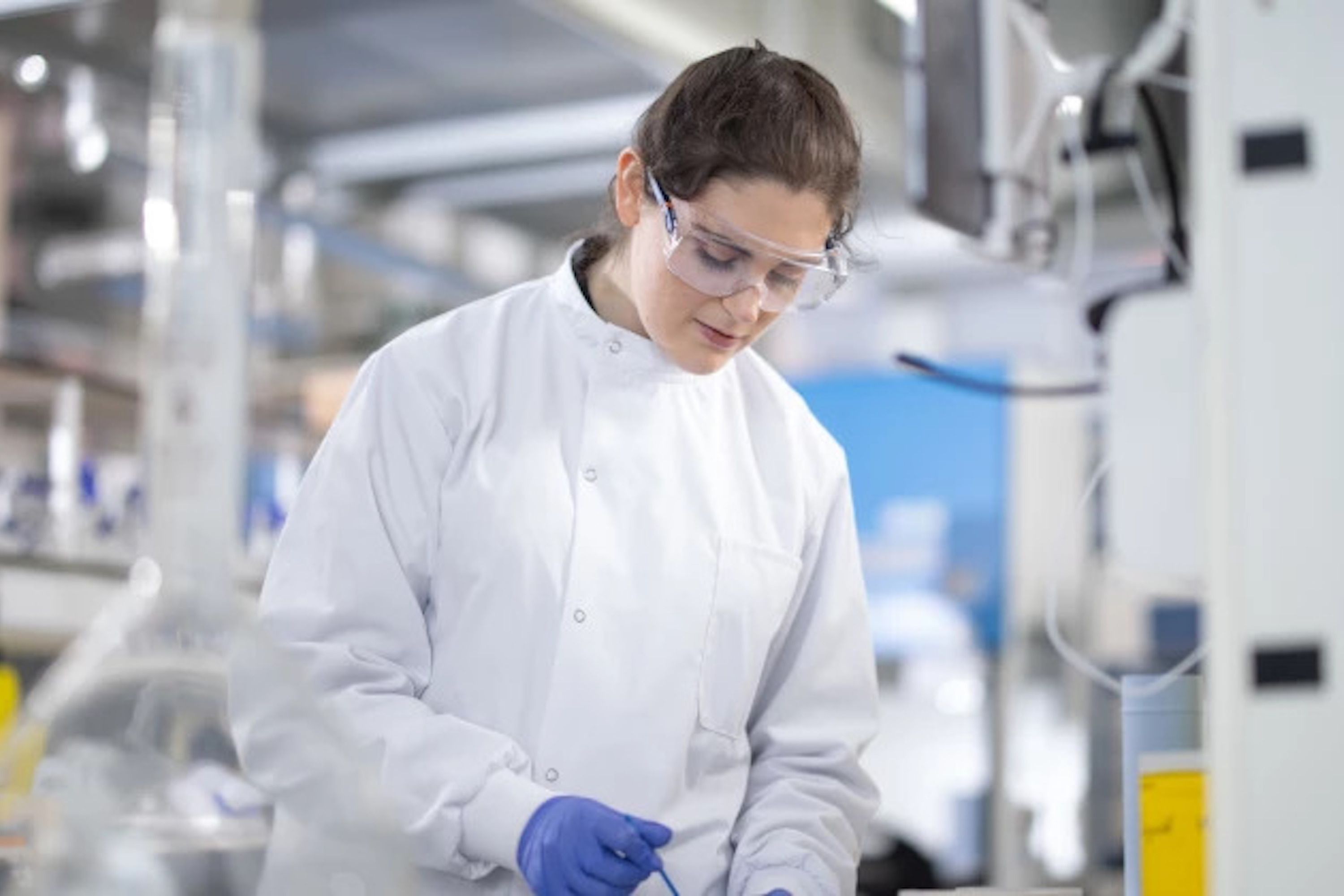
Request info
Learn more about studying at Imperial. Receive useful information about our life in our undergraduate community and download our latest Study Guide.

Events, tasters and talks
Meet us and find out more about studying at Imperial.

Course data
Terms and conditions
There are some important pieces of information you should be aware of when applying to Imperial. These include key information about your tuition fees, funding, visas, accommodation and more.
You can find further information about your course, including degree classifications, regulations, progression and awards in the programme specification for your course.
Programme specifications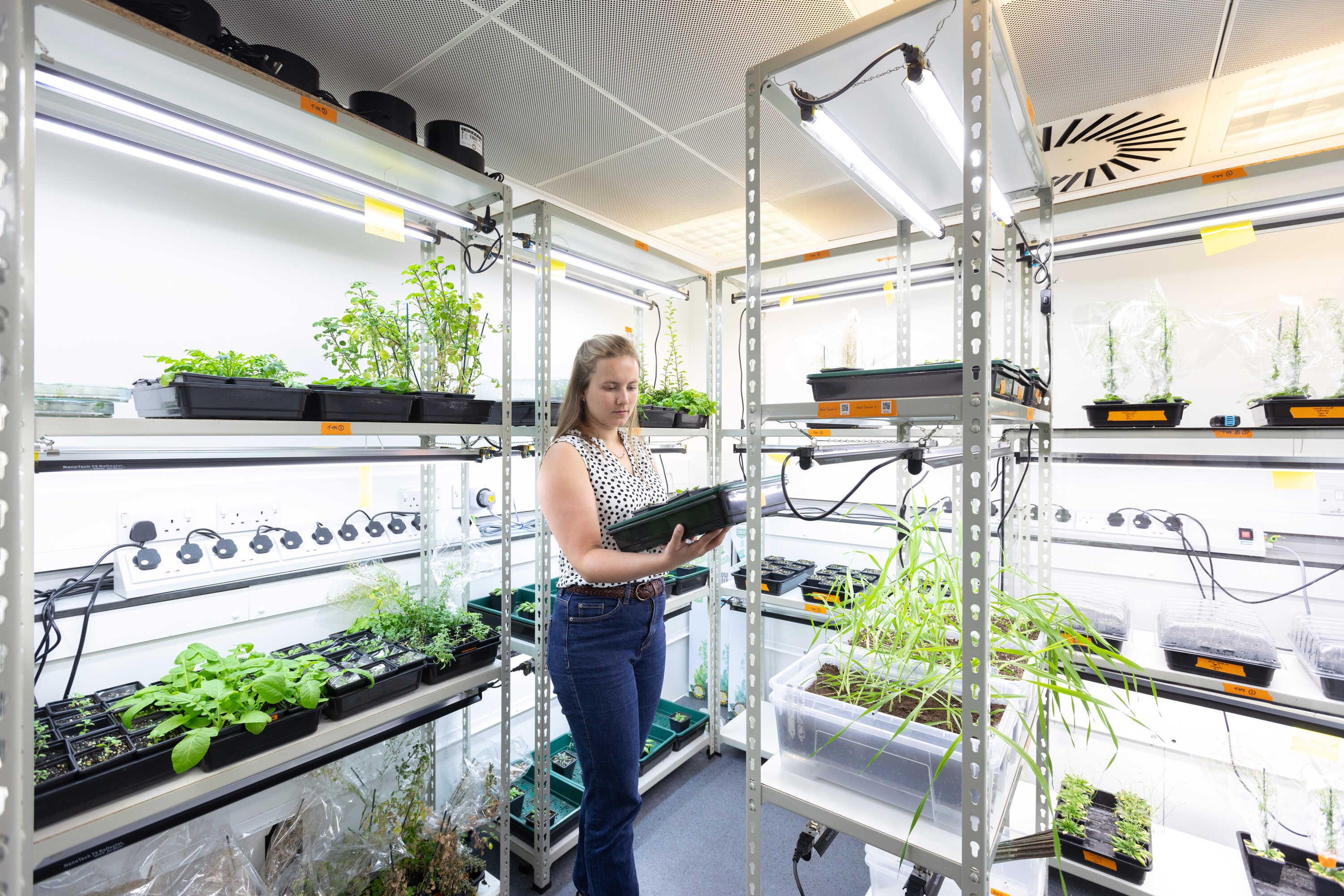
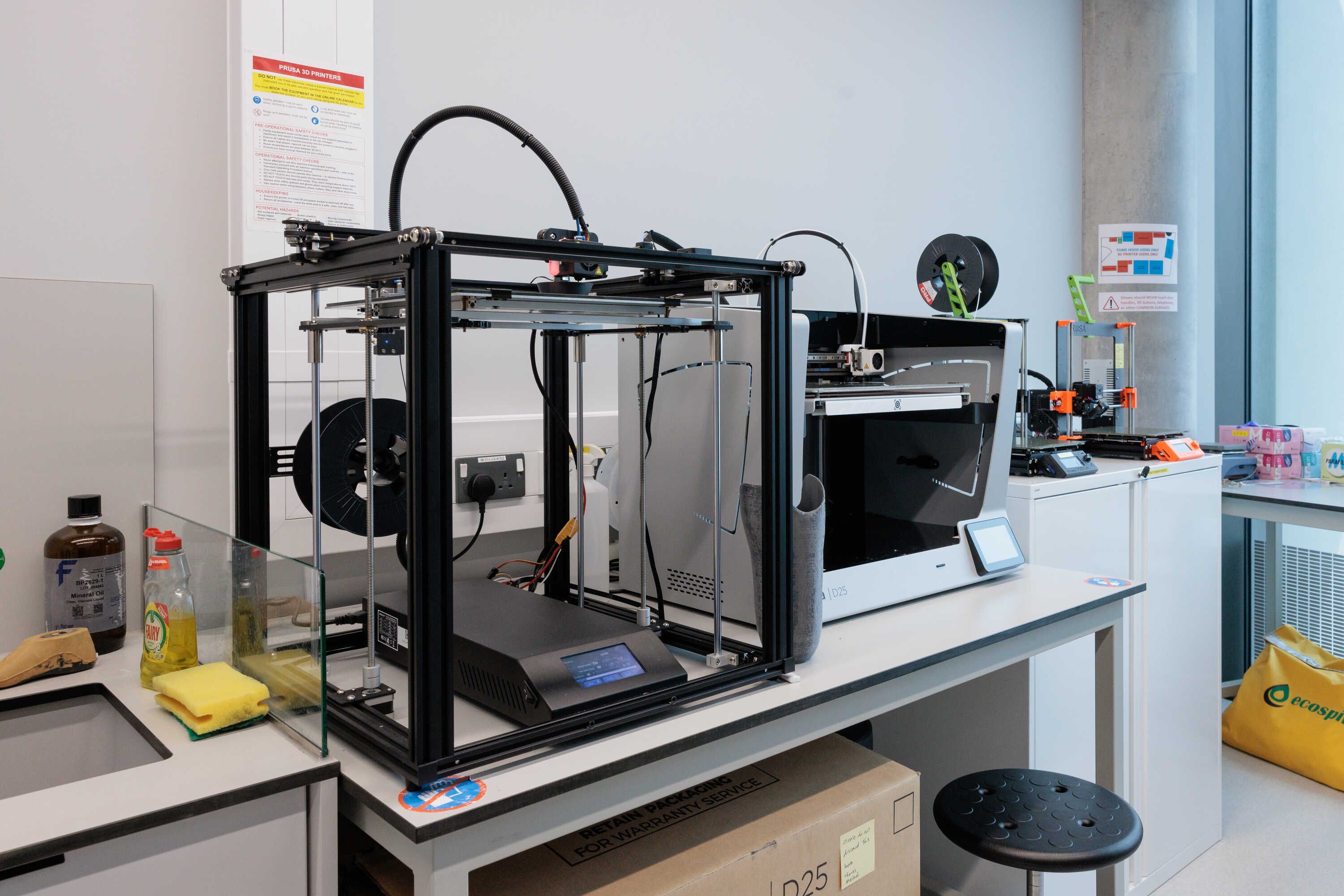
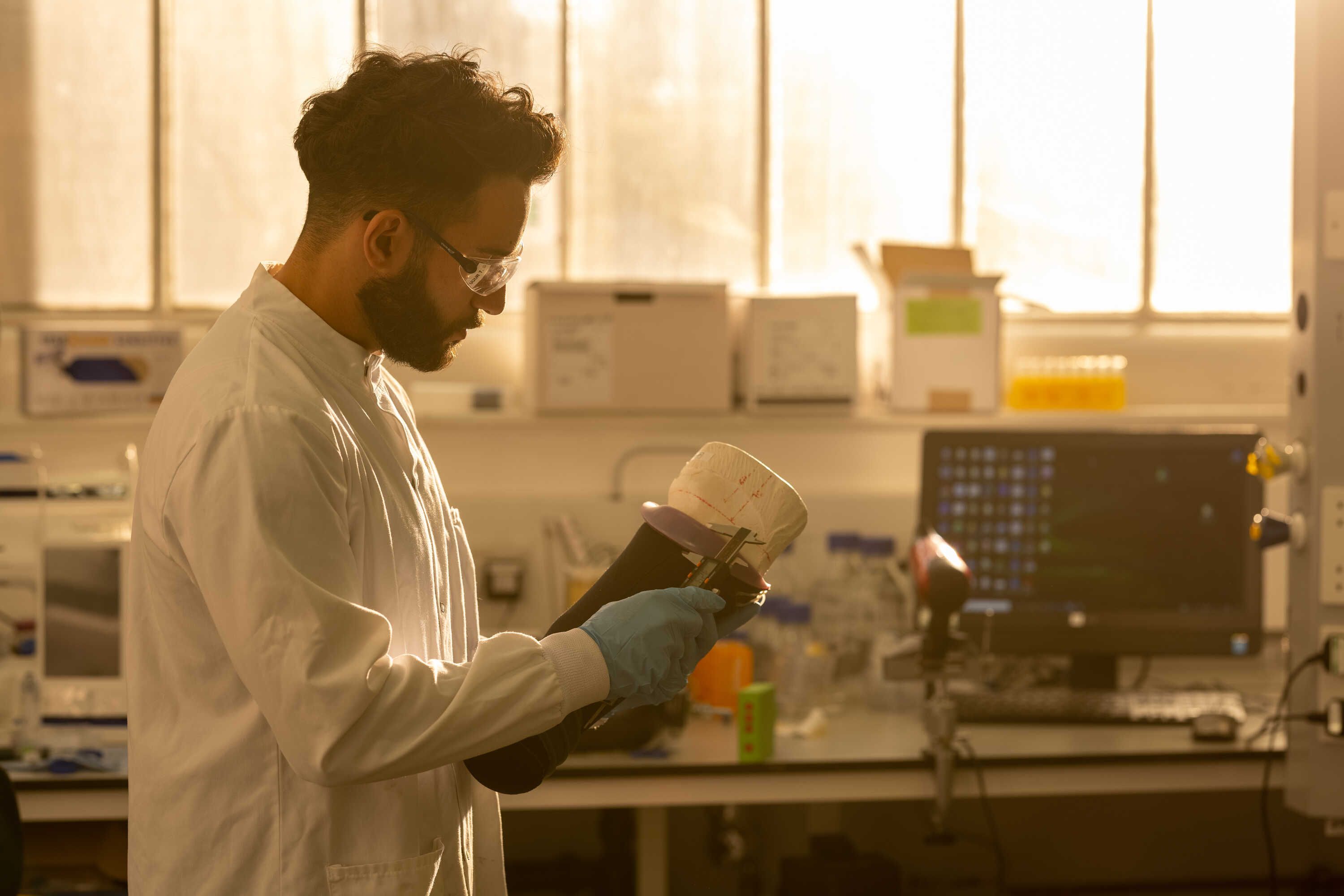
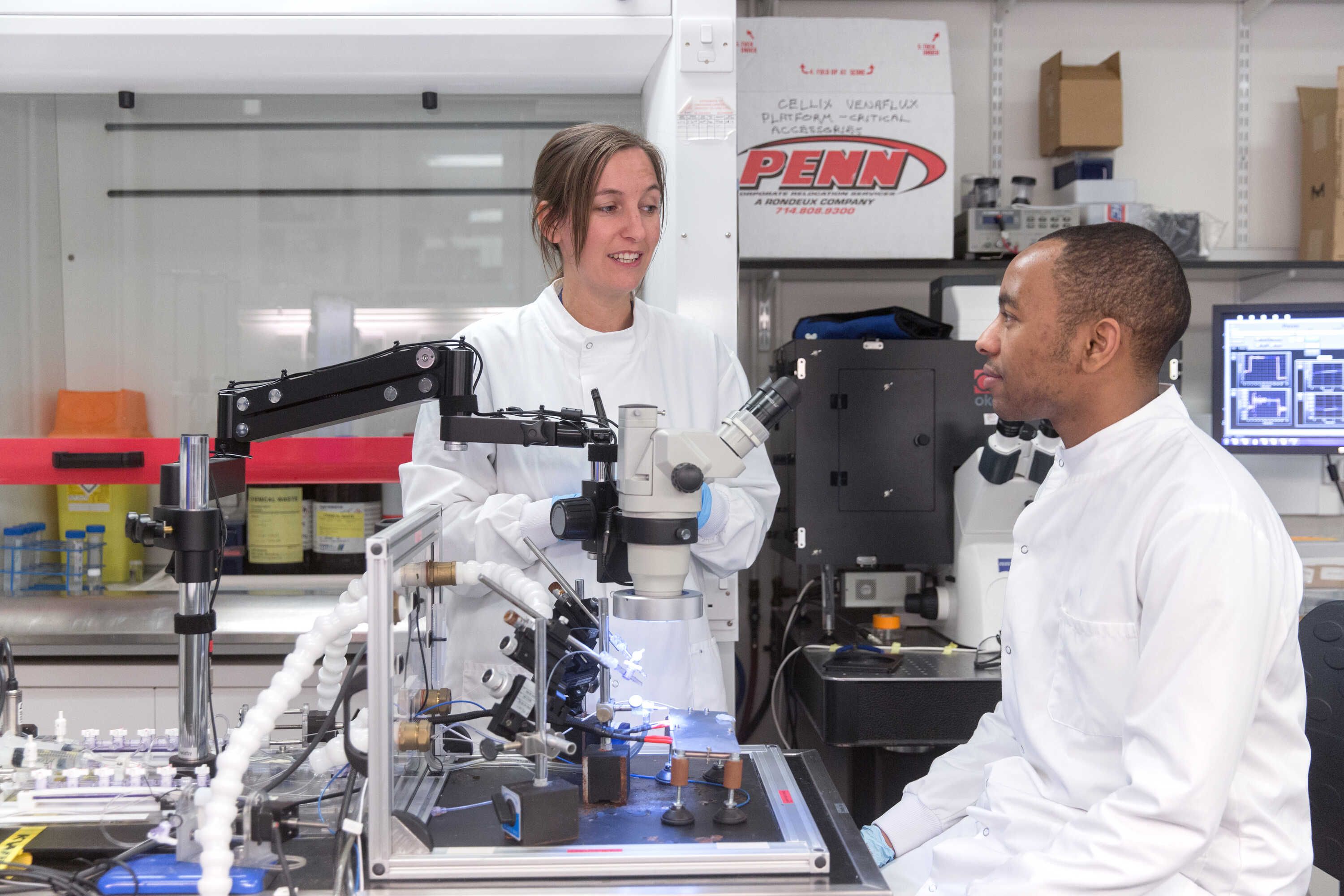
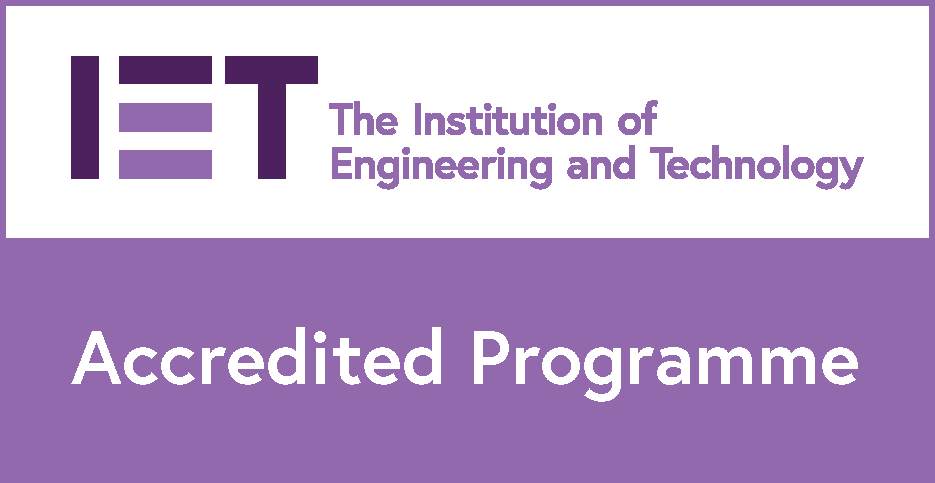

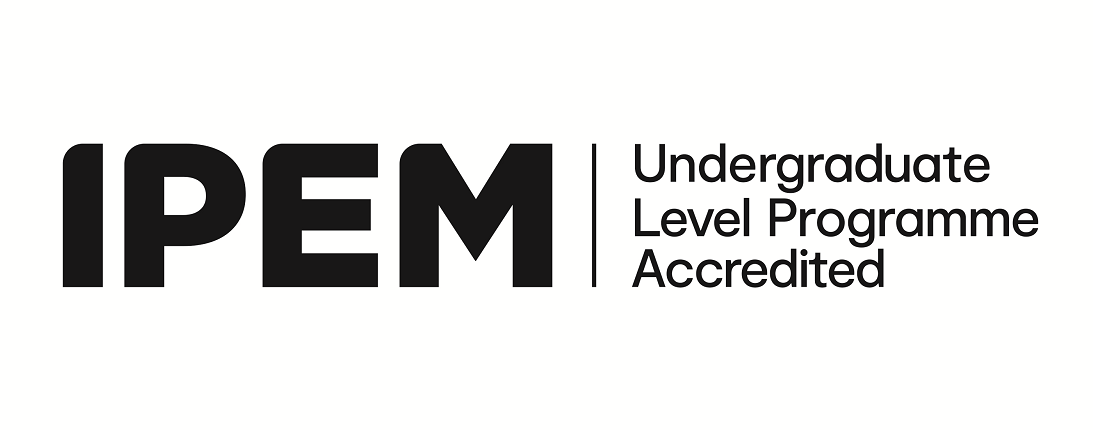
.png)